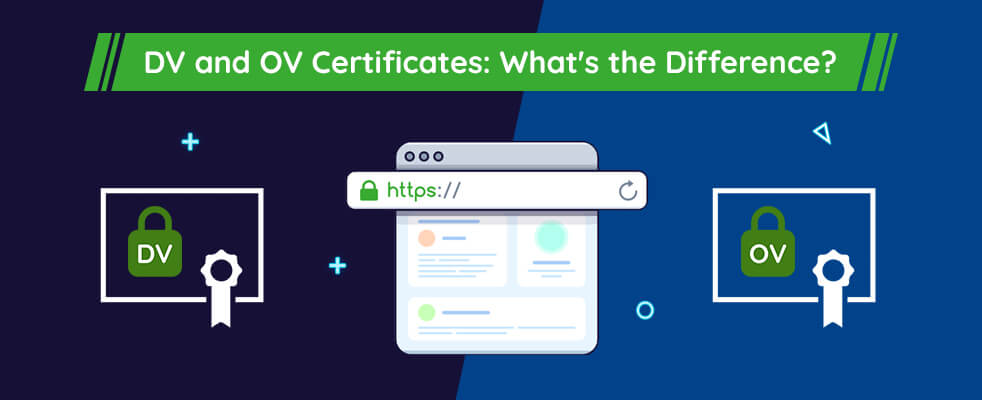In today's digitally-driven world, ensuring the security of online interactions has become a paramount concern. As more and more activities shift to the virtual realm, the need for secure communication and data exchange has led to the widespread use of SSL/TLS certificates. Two common types of certificates that you might come across are Domain Validated (DV) and Organization Validated (OV) certificates. In this blog post, we will dive into the differences between these two types of certificates and explore when each might be the right choice for your website.
Understanding SSL/TLS Certificates
SSL (Secure Sockets Layer) and its successor TLS (Transport Layer Security) are cryptographic protocols that provide secure communication over networks like the internet. SSL/TLS certificates play a vital role in establishing the authenticity of websites and enabling encrypted data transmission between users and servers.
Domain Validated (DV) Certificates
DV certificates are the most basic type of SSL/TLS certificates. Their primary purpose is to encrypt the connection between a user's browser and a website's server. The validation process for DV certificates is quick and automated, primarily confirming that the certificate requester has control over the domain they wish to secure. This process typically involves responding to an email sent to a designated address associated with the domain or by adding a specific DNS record.
While DV certificates provide encryption, they don't offer the same level of validation and assurance as other types. As a result, they are generally recommended for personal blogs, small informational websites, and other platforms where user trust and identity verification are less critical.
Organization Validated (OV) Certificates
OV certificates, on the other hand, provide a higher level of validation and credibility compared to DV certificates. To obtain an OV certificate, the certificate authority (CA) verifies not only domain ownership but also certain details about the organization behind the website. This includes confirming the legal existence of the organization, its physical address, and contact information.
The validation process for OV certificates is more thorough and can involve manual checks by the CA's validation team. This added layer of verification makes OV certificates more suitable for businesses and organizations that handle sensitive information, engage in e-commerce, or require a higher level of user trust.
Key Differences
1. Validation Process
The most significant difference between DV and OV certificates lies in the validation process. DV certificates are validated through automated methods, often requiring nothing more than an email confirmation or DNS record update. OV certificates, on the other hand, involve a more rigorous verification process that includes confirming organizational details.
2. Level of Trust
Due to the comprehensive validation process, OV certificates instill a higher level of trust in users compared to DV certificates. When users see the "padlock" icon in their browser's address bar along with the organization's name, it helps assure them of the website's authenticity and enhances their confidence in sharing sensitive information..
3. Use Cases
DV certificates are suitable for websites where encryption is the primary concern and where users don't need extensive verification of the organization's identity. Examples include personal blogs, hobby websites, and simple informational pages.
OV certificates are more appropriate for websites that handle user data, engage in online transactions, or require a strong online presence. E-commerce platforms, corporate websites, and financial institutions often opt for OV certificates to establish credibility and ensure secure interactions.
Making the Right Choice
The choice between DV and OV certificates depends on your website's purpose and the level of trust you want to establish with your users. While DV certificates offer essential encryption, OV certificates provide a higher level of assurance and trustworthiness, making them the preferred choice for businesses and organizations that prioritize online security and credibility.
In the end, the type of certificate you choose should align with your website's goals, user expectations, and the sensitivity of the information you handle. By making an informed decision, you can ensure that your website not only encrypts data but also conveys a sense of security to your visitors.
HAW Company takes pride in offering cutting-edge SSL (Secure Sockets Layer) services designed to safeguard your online presence and protect sensitive data. Our SSL solutions are tailored to meet the diverse security needs of businesses and individuals in the digital age. With our SSL certificates, you can ensure that data transmissions between your website and your users remain encrypted and secure. Our range of SSL offerings includes Domain Validated (DV) certificates for quick and efficient encryption, as well as Organization Validated (OV) certificates for enhanced trust and identity verification. Whether you're running a personal blog, an e-commerce platform, or a corporate website, our SSL services provide the peace of mind that comes with knowing your online interactions are shielded from prying eyes. Partner with HAW Company to establish a solid foundation of security, credibility, and trust for your digital endeavors.

